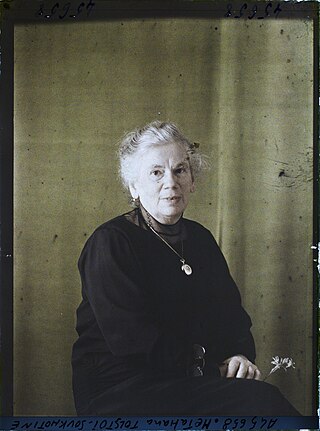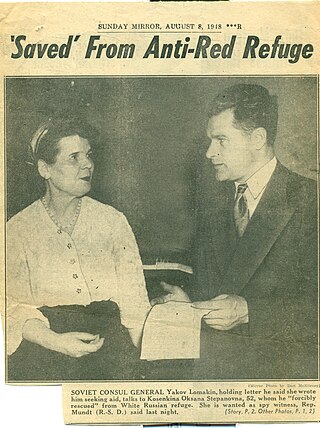Related Research Articles

The House of Tolstoy, or Tolstoi, is a family of Russian gentry that acceded to the high aristocracy of the Russian Empire. The name Tolstoy is itself derived from the Russian adjective "толстый". They are the descendants of Andrey Kharitonovich Tolstoy, who moved from Chernigov to Moscow and served under Vasily II of Moscow in the 15th century. The "wild Tolstoys", as they were known in the high society of Imperial Russia, have left a lasting legacy in Russian politics, military history, literature, and fine arts.

Valley Cottage is a hamlet and census-designated place in the town of Clarkstown, New York, United States. It is located northeast of West Nyack, northwest of Central Nyack east of Bardonia, south of Congers, northwest of Nyack, and west of Upper Nyack. The population was 9,107 at the 2010 census.

Tatyana Nikitichna Tolstaya is a Russian writer, TV host, publicist, novelist, and essayist from the Tolstoy family.

Count Nikolai Dmitrievich Tolstoy-Miloslavsky, known as Nikolai Tolstoy, is a British monarchist and historian. He is a former parliamentary candidate of the UK Independence Party and is the current nominal head of the House of Tolstoy, a Russian noble family.

Countess Alexandra (Sasha) Lvovna Tolstaya, often anglicized to Tolstoy, was the youngest daughter and secretary of the noted Russian novelist Leo Tolstoy.

Yasnaya Polyana is a writer's house museum, the former home of the writer Leo Tolstoy. It is 12 kilometres (7.5 mi) southwest of Tula, Russia, and 200 kilometres (120 mi) from Moscow.

Prince Teymuraz Bagration of Mukhrani was a Georgian-Russian nobleman and an émigré in the United States where he served as President of the Tolstoy Foundation, a New York-based charitable organization.

Departure of a Grand Old Man is a 1912 Russian silent film about the last days of author Leo Tolstoy. The film was directed by Yakov Protazanov and Elizaveta Thiman, and was actress Olga Petrova's first film.

Tatiana is a female name of Sabine-Roman origin that became widespread in Eastern Europe.

Countess Tatiana Lvovna Sukhotina-Tolstaya, was a Russian painter and memoirist. She is the second child and oldest daughter of writer Leo Tolstoy.

Count Lev Nikolayevich Tolstoy, usually referred to in English as Leo Tolstoy, was a Russian writer regarded as one of the greatest and most influential authors of all time. He received nominations for the Nobel Prize in Literature every year from 1902 to 1906 and for the Nobel Peace Prize in 1901, 1902, and 1909.
Tolstoy is a noble Russian family name derived from the Russian adjective "то́лстый".

The Fruits of Enlightenment, aka Fruits of Culture is a play by the Russian writer Leo Tolstoy. It satirizes the persistence of unenlightened attitudes towards the peasants amongst the Russian landed aristocracy. In 1891 Constantin Stanislavski achieved success when he directed the play for his Society of Art and Literature organization.

Countess Sophia Andreyevna Tolstaya, sometimes anglicised as Sofia Tolstoy, Sophia Tolstoy and Sonya Tolstoy, was a Russian diarist, and the wife of writer Count Leo Tolstoy.

The Consulate-General of Russia in New York City is the diplomatic mission of the Russian Federation in New York City. Opened in 1994, the consulate is located at 9 East 91st Street in the former John Henry Hammond House in the Upper East Side of Manhattan. A consulate of the former Soviet Union had previously existed on East 61st Street from 1933 until 1948.

Count Ilya Lvovich Tolstoy was a Russian writer, and the third child and second son of Leo Tolstoy.

Novo-Diveevo Convent is a female monastic community in Nanuet, Rockland County, New York in the United States, that was founded in 1949. It is under the auspices of the Russian Orthodox Church Outside Russia. It is also called the Stavropighial Convent of the Holy Dormition. Locally and officially it is simply called The Russian Orthodox Convent.

The Congress of Russian Americans is a non-governmental organization in the United States representing Russian-Americans and Russians. The CRA's stated purposes include preserving Russian culture in the United States, protecting the rights of Russian-Americans, fighting Russophobia, and improving relations between Russians and Americans.

The Kasenkina Case (Russian: "Дело Касенкиной") was a 1948 Cold War-era political scandal associated with the name of Oksana Kasenkina, a teacher of chemistry at the Soviet school in New York. Kasenkina disappeared and was believed by the American public to have been abducted by Soviet officials after wishing to seek asylum in the United States. The events were sensationalized by the media and became part of the Red Scare. In reality, the most likely explanation of events is that Kasenkina suffered from mental instability and expressed a genuine wish to return to the Soviet Union. The full scope of events only became clear 50 years later when the top-secret documents from the State Department and FBI were declassified and released to the public.

Lev Tolstoy is a 1984 Soviet drama film directed by Sergey Gerasimov.